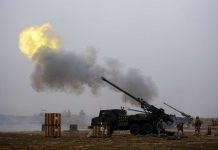
U.S. lawmakers across party lines have expressed broad support for President Biden’s decision to authorize a shift in American policy, enabling Ukraine to use long-range U.S. missiles to strike targets within Russia. This significant escalation occurred just weeks after President-elect Trump’s victory over Vice President Harris, with some of his strongest Capitol Hill supporters voicing skepticism about continued U.S. backing for Ukraine. Donald Trump Jr. even warned that the policy change could risk triggering a global conflict.
However, key congressional figures from both parties contend that this more robust U.S. approach aligns with strategic interests, especially in light of North Korean troop deployments in the region. Rep. Salud Carbajal (D-Calif.) emphasized the necessity of assisting Ukraine in pushing back Russian forces. On the other hand, some Republicans argued that the policy shift came too late, with Rep. Michael McCaul (R-Texas) urging the administration to allow Ukraine full use of the military aid it has received without further restrictions.
In response to the move, Russia has recalibrated its nuclear posture, signaling that an attack on Russian territory using conventional weapons, backed by nuclear powers, would be considered grounds for a nuclear response. This has heightened concerns of a major escalation. Yet, Rep. Gregory Meeks (D-N.Y.) downplayed the threat, placing the blame on Russia for its increasing military actions, including the deployment of North Korean troops.
Some Republicans, such as Rep. Brian Mast (R-Fla.), have urged caution, stressing that the increased nuclear threat should be taken seriously. Biden’s approval of the Army Tactical Missile System (ATACMS) for Ukraine will significantly enhance Kyiv’s strike capabilities, allowing it to target critical Russian assets deep within Russian territory. Ukraine has long lobbied for these long-range missiles, and their use began in earnest with a strike on an ammunition depot in Bryansk.
The move is expected to provide Ukraine with additional leverage in future negotiations, especially as the conflict continues to drag on. Despite heavy casualties on both sides, Russian forces have made incremental gains in eastern Ukraine, and some lawmakers, like Rep. Rich McCormick (R-Ga.), suggest that Russia may seek peace following the inauguration of a new U.S. president.
However, the policy shift has drawn criticism from Trump supporters, who have long advocated for a reduction in U.S. support for Ukraine. Rep. Mike Waltz (R-Fla.) characterized the decision as an unwarranted escalation, while Rep. Cory Mills (R-Fla.) described it as a misguided step in the wrong direction.
Sen. Lindsey Graham (R-S.C.) supported the ATACMS decision but accused Biden of making the move for political reasons, particularly to complicate Trump’s foreign policy stance. Similarly, Rep. Nancy Mace (R-S.C.) expressed concerns over what she saw as an abrupt shift in U.S. policy, questioning whether the change was motivated by political maneuvering rather than strategic imperatives.
While some critics worry that Trump could seek to de-escalate by conceding territory to Russia, Rep. Darrell Issa (R-Calif.) argued that Trump’s experience with Putin would enable him to negotiate effectively, ensuring that Ukraine is not hamstrung in the process. Ultimately, the decision to approve ATACMS is seen by some as a move to bolster Ukraine’s position, while others worry about the broader geopolitical ramifications.





